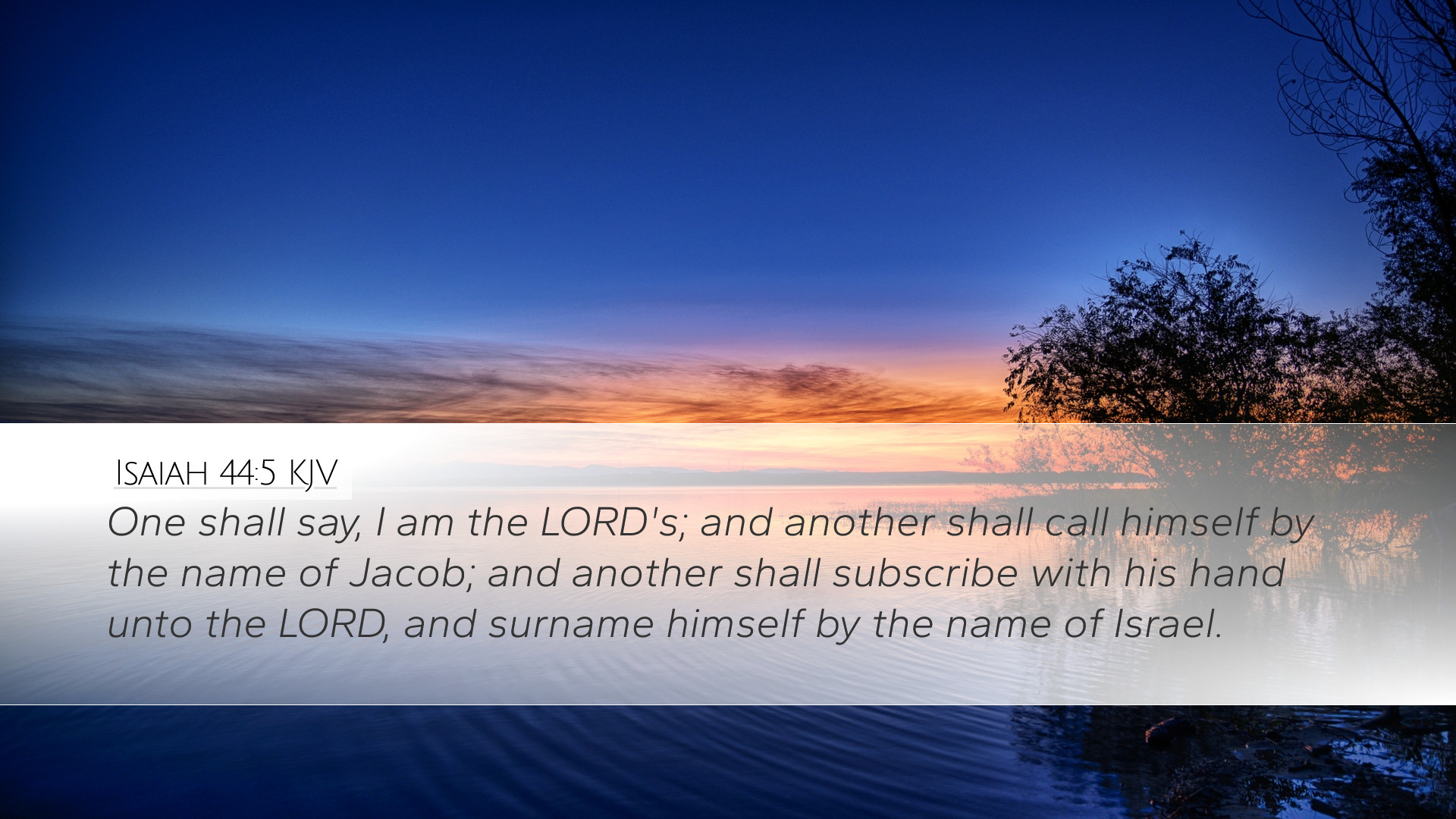Commentary on Isaiah 44:5
Verse Context: Isaiah 44:5 states, "One will say, 'I am the Lord's'; another will call himself by the name of Jacob; another will write on his hand, 'The Lord's,' and name himself by the name of Israel."
Introduction
This verse from Isaiah reflects a profound declaration of identity and allegiance to the Lord. It resonates with themes of ownership, divine calling, and the importance of names in relation to one's faith. This commentary draws on insights from notable public domain commentaries to explore its implications and applications.
Exegesis
Isaiah 44:5 is situated within the broader message of the prophet Isaiah, who speaks to the people of Israel about their identity and relationship with God. The chapter contrasts the living God with idols and asserts the sovereignty and uniqueness of Yahweh. This particular verse highlights individual declarations of faith and commitment to God.
Text Analysis
- Personal Affirmation: The verse begins with individuals asserting their commitment to the Lord. This reflects a personal and communal affirmation of faith that transcends mere belief.
- Identity in God: By calling themselves “the Lord's,” the individuals acknowledge their belonging to God and their identity as His people. This aligns with the larger biblical theme of identity being rooted in divine relationship.
- Historical Reference: Naming oneself after “Jacob” and “Israel” connects to the heritage of God’s people, emphasizing the continuity of God’s covenant throughout generations.
Theological Implications
The verse invites deep theological reflection on identity, belonging, and the significance of names in the biblical tradition. It challenges believers to consider what it means to be claimed by God and how this shapes their understanding of self.
Matthew Henry's Commentary Insights
Henry illustrates how this declaration is not merely vocal but a profound internal transformation. The names invoked—“Lord,” “Jacob,” and “Israel”—demonstrate a rich tapestry of identity that signifies relationship, history, and promise.
Henry emphasizes that true believers will willingly acknowledge their allegiance to God, showcasing a faith that is both vocal and active. The idea is that their identity is transformed by their faith in God, leading to outward expressions of inner conviction.
Albert Barnes' Commentary Insights
Barnes highlights the significance of writing the Lord's name as a sign of ownership and commitment. He discusses the cultural background where inscriptions and declarations symbolized one's allegiances. This act signifies a public acknowledgment of God as sovereign.
Moreover, Barnes indicates that the prophecy anticipates a time of restoration where Israel would again embrace their identity as God’s chosen people, which illustrates a hopeful future amidst current struggles.
Adam Clarke's Commentary Insights
Clarke explores the implications of the personal declarations being made. He suggests a prophetic tone that not only speaks to Israel's past but also looks forward to a future where God’s people would reclaim their identity and purpose.
Clarke categorizes the responses to God's call, highlighting that these statements reflect a deep conviction and readiness to identify with the Lord's name. He notes that such identification is essential for spiritual vitality.
Practical Applications
For pastors, students, theologians, and scholars, this verse and its commentary provide rich material for sermon preparation, teaching, and personal reflection. It invites various applications:
- Identity in Christ: Believers are called to recognize their identity in Christ and openly declare their allegiance to Him.
- Public Affirmation: Consider the ways in which individuals can publicly affirm their faith as a testimony to God's transformative power.
- Heritage and Continuity: Reflect on the importance of spiritual heritage in the context of faith communities, valuing connection to past generations.
- Hope and Restoration: Use this verse as a backdrop for discussions about hope and restoration within the church and individual lives.
Conclusion
Isaiah 44:5 serves as a significant reminder of the believer's identity in God. It challenges individuals to openly acknowledge their commitment to the Lord and to reflect on how this identity shapes their actions and interactions in the world. Through the insights provided by commentators such as Matthew Henry, Albert Barnes, and Adam Clarke, deeper understanding of this text enriches the faith journey, urging each believer to live out their identity as “the Lord’s” with boldness and clarity.


